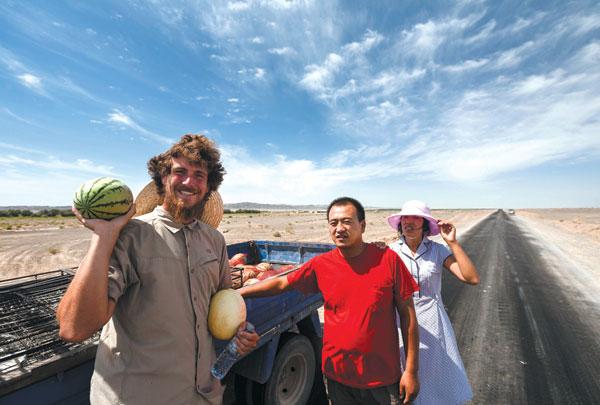

While walking through the Gobi desert, Rehage often receives watermelons as gifts.
"I walked for three-and-a-half weeks. I was tired, but I felt comfortable, free and cool," he says.
Rehage chose to study Sinology at the University of Munich and went to Beijing in 2005 as an exchange student for one year. He then stayed for another year learning photography, and came up with the idea of walking home.
He walked through bustling cities and isolated villages, across plains and the Gobi desert. He recorded folk customs of different regions, noted details of everyday life, and pondered conversations about village life, environmental pollution, construction and personal relationships.
He looked into the history of Chinese cultural relics and the people's attitude toward them.
He also recorded his feelings spending nights on the fields, in old temples and in the beds of hospitable families that adopted him.
"The most lovable part about walking is, people know you are vulnerable and need help, so they accept and help you. Then you get a chance to enter into their lives," he says.
Rehage says many German readers try to learn about China from his book, but he is very humble about what he could tell them.
"They see something different about China in my book, small cities and villages that have been long neglected. But I won't say it is an objective China, only what I experienced around 2008."
Rehage says that many foreigners visit places of interest, such as the Great Wall and the Forbidden City, and then get the feeling that the Chinese are materialists and only out for money.
He recalls when he started walking, he would take all his valuables with him while going to the washroom, thinking they might get stolen.
"In fact, in villages, if you put your bags down, when you come back three hours later, they are still there. Even if they are not, it's probable someone has put it somewhere safe."
While observing people's lives, Rehage also reflected on his own inner world. He was honest about being emotional, shy and scared.
Rehage says it was difficult to start the long journey, but the decision to end halfway was even harder. He went home, continued college in Germany but could not forget China. He continues to share his views and his experiences with about 54,000 fans on Sina Weibo, China's answer to Twitter, every day.
Copyright ©1999-2018
Chinanews.com. All rights reserved.
Reproduction in whole or in part without permission is prohibited.